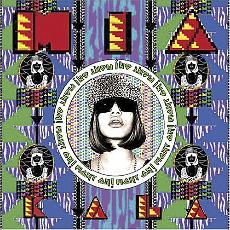Karina Gonzalez
High-energy, culturally aware, and overtly militant, M.I.A.’s second album, “Kala,” adds a new dynamic to her already powerful work.
It’s been two years since the Sri Lankan singer-slash-rapper released “Arular,” more an appeal to pop culture than to any sort of global concerns, but her sophomore debut comes off strikingly more personal.
The daughter of a Tamil Tiger, Maya “M.I.A.” Arulpragasam knows all-too-well the suffering associated with a guerilla lifestyle; troubles to which young Americans, for the most part, are grossly ignorant. Such issues shape the underlying theme of “Kala.”
Along with her newfound freedom of expression, M.I.A. took the opportunity with this release to explore her roots. “Kala,” named after her mother, features both Indian artists and strong Bhangra beats, seamlessly integrated with the catchy hooks reminiscent of her 2005 hit “Galang.”
Disguised in songs with names like “Mango Pickle” and “Bamboo Banga” are messages intended to bring our attention to the cultural strife and tension of peoples hitherto wholly absent from our consciousness.
Arulpragasam sings against ignorance and against discrimination, and calls for their eradication by any means necessary-her favorite, it seems, would be guerilla warfare.
M.I.A.’s allure with young people stems primarily from her utter individuality. In a sea of crappy so-called artists like Fallout Boy, Akon and Paris Hilton, her style is unique to the point of being unidentifiable.
It’s rap, it’s dance, it’s Hindi, it’s Bhangra, it’s pop. And the presence of such dramatic juxtaposition may well be due to the fact that “Kala” was made in India, away from American record labels and producers.
Why India? Well, because our government is now kicking out controversial recording artists in the name of homeland security.
Fortunately for fans, India turned out a more-than-satisfactory, very much street-worthy record.
But however amazing the album as a whole, Timbaland proves himself heinously ignorant during his cameo in “Come Around,” where he makes reference to M.I.A.’s “teepee.” Alas, not only is she not Indian, but even if she were, there aren’t teepees in India. The fact that our girl allowed it is indeed equally disappointing.
Despite the slip-up though, “Kala” is nothing short of “bah-na-nahs,” and we can only hope that in two year’s time, our favorite Sri Lankan is still forced to think outside our borders.
Overall Rating: A

Cover art for M.I.A.’s “Kala” ()
